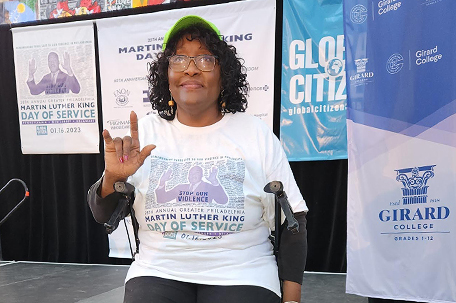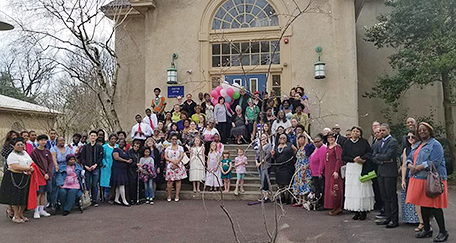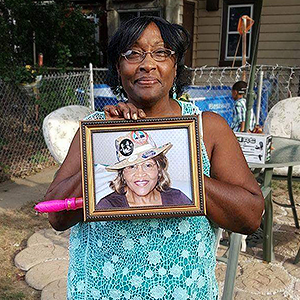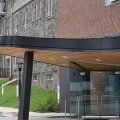
ABOVE PHOTO: Roz McKelvey (Photo courtesy of Roz McKelvey)
By Constance Garcia-Barrio
Roz McKelvey’s life turned on the flip of a hamburger.
“We lived on Mt. Pleasant Avenue,” said McKelvey, a Germantown-Mt. Airy resident for 62 of her 67 years. “My mother, Florence Garrett, was the first Black person on the block,” McKelvey said, recalling incidents of harassment. “After I graduated from Germantown High in the class of ’73 — I was class president — I began working at Gino’s (later the site of the former Trolley Car Diner),” McKelvey said. It was across the street from the old campus of the Pennsylvania School for the Deaf (PSD) at 7500 Germantown Avenue.
“PSD students would come over to order food,” McKelvey said. “Gino’s had that whole restaurant, but nobody knew signs, so I asked the students to teach me.”
Those informal lessons 50 years ago set the course of McKelvey’s life. She began volunteering at PSD events and helping in the office. That assistance led to an offer for her to become a dormitory counselor. McKelvey accepted. Later, she worked as an assistant teacher in PSD’s vocational food-service class.
After McKelvey married in 1981 and had a son and a daughter, she left PSD and became a foster parent.
“I fostered 14 children,” she said. “Eight of them were deaf, and some had special needs.
Raising foster children reflected the neighborliness McKelvey’s mother had taught her.
“If somebody dies, you take the family a basket of food, whether you liked the person or not,” she said. “We all have to do our part. You have to be there for people.”
For McKelvey, that meant advocating more systematically for the deaf.
“Deaf friends would tell me that they weren’t going to church because there was no sign language interpreter,” McKelvey said. “In one case, a deaf man had no interpreter for his mother’s funeral. I began signing at services of different denominations.”
I work closely with Grace United Methodist Church and others as well,” McKelvey, who received an award for evangelism, added. In 1998, she founded Germantown Deaf Ministries Fellowship [GDMF], Inc.
“We support the deaf and hard of hearing community in order to create a less restrictive environment for its members,” she said. “We work with faith-based organizations, educational institutions, and community groups to aid deaf families, deaf and disabled people in nursing homes, and others.”
GDMF has a five-night sign language camp for all ages, a deaf/hearing Town WatchNight out, and other services and events. A monthly meeting and social gathering is held by the nonprofit on the first Thursday of the month.
One of GDMF’s recent projects is centered on teaching people to say “I love you” in sign language.
“If you’re making that sign, you can’t stab or shoot anyone,” McKelvey said.
McKelvey explained the difference between a qualified interpreter, which she is, and a certified interpreter.
“A qualified interpreter has the skill,” she said. “If you’re certified, you have papers.”
McKelvey specified that she advocates for the rights of hearing-impaired persons rather than acting as interpreter. Sometimes that means being a keen observer.
“In one case, a deaf woman’s abusive boyfriend was serving as her interpreter,” McKelvey said. “He wasn’t interpreting her signs correctly, and I pointed it out. By the same token, you can’t let abusive parents be interpreters for their deaf abused children. The interpreter must be neutral and accurate.”

McKelvey’s growing prominence led her to being called in for medical crises.
“A deaf man was having a seizure,” she said. “His sister, who was his caregiver, took him to the ER because she couldn’t wake him up. There was no interpreter available, and his sister wanted to know how they were going to care for him if they couldn’t communicate.”
The hospital eventually brought in an interpreter, but not before a nurse nearly gave him a double dose of medication, McKelvey said.
Another instance involved a couple. The wife was deaf and in labor, but the hospital staff didn’t want to let the husband, who was hard of hearing, into the delivery room. Since the hospital had no sign language interpreter for the wife, the staff finally agreed to let the husband stay with his wife, McKelvey said.
“I keep up a rapport with local hospitals,” McKelvey, who is also a chaplain at Einstein, said. “I can go to the hospital as an advocate, to keep someone company. I can explain that a person is thirsty or tired, but I’m not a medical interpreter.”
McKelvey has also joined other Deaf advocates in stressing the importance of having both closed captions and showing a sign language interpreter in emergencies and disasters. During the recent scare about the possible water contamination due to a chemical spill, she helped monitor television stations to make sure that an interpreter was on screen updating hearing-impaired viewers.

Besides a long-established reputation in Philly’s Deaf community, McKelvey has had her picture taken with politicos like Joe Biden and John Fetterman. She’s also known is known in surrounding counties.
“I attended the 10th Annual Deaf Expo in West Chester last Saturday,” she said, speaking of the event held at Christ the King Church which featured deaf artisans, vendors, and organizations.
McKelvey stays abreast of her former students’ accomplishments.
“Neil McDevitt, a PSD alum, was elected mayor of North Wales in 2022,” she said. McDevitt is the first deaf mayor in Pennsylvania, and possibly in the U.S.
McKelvey has garnered awards for her work. She earned a citation from City Council for her “dedication and service to Deaf and hard of hearing residents of Philadelphia’s Eighth Councilmanic District.”
In 2019, the Deaf and Hard of Hearing of Southeastern Pennsylvania named McKelvey as their ‘Person of the Year” for her advocacy and service.
Besides directing GDMF, McKelvey continues her long-standing service as a block captain and Town Watch leader, despite a barrage of health challenges.
“I injured both ankles and a knee at PSD, and I’m a breast cancer survivor. The surgery also removed some lymph nodes, so I get lymphedema, or swelling. It’s a good thing that signing keeps my arms moving,” McKelvey said, adding that she has carpal tunnel syndrome in both wrists and an allergy to too strong sunlight. “It makes me swell up.”
She has also been mugged, and her front window has bullet holes from a nearby gun fight. Despite these difficulties, she’s poised to mark the 25th anniversary of GDMF on April 22 with a tea for deaf and hearing women.
“It’s international,” McKelvey, who is also a linguist, said. “Spanish, Hebrew, Mandarin and other languages will be spoken there.”.
“Deafness is not a disability — it’s a proud culture,” McKelvey said. “I’m blessed to be an advocate.”
Germantown Deaf Ministries Fellowship welcomes volunteers and donations. Please contact them at: [email protected], visit: www.germantowndeafministries.org, or call them at: (267) 225-0047.
Tips on communicating with Deaf persons:
–Face a deaf person when you speak.
–Don’t assume that every deaf person reads lips.
–COVID masks and beards present an obstacle.
–Speak slowly and articulate clearly.
–Use pen and paper to communicate if necessary.
The National Association of the Deaf (NAD) has free webinars on many aspects of deafness. See https://www.nad.org/resources/webinars/
The Pennsylvania School for the Deaf, 100 W. School House Lane, offers programs and resources: (215) 951-4700, https://psd.org/.
















Leave a Comment